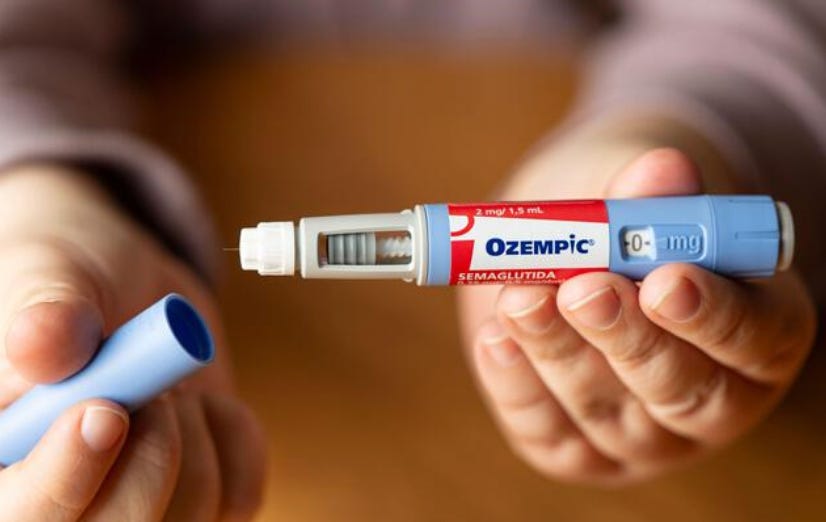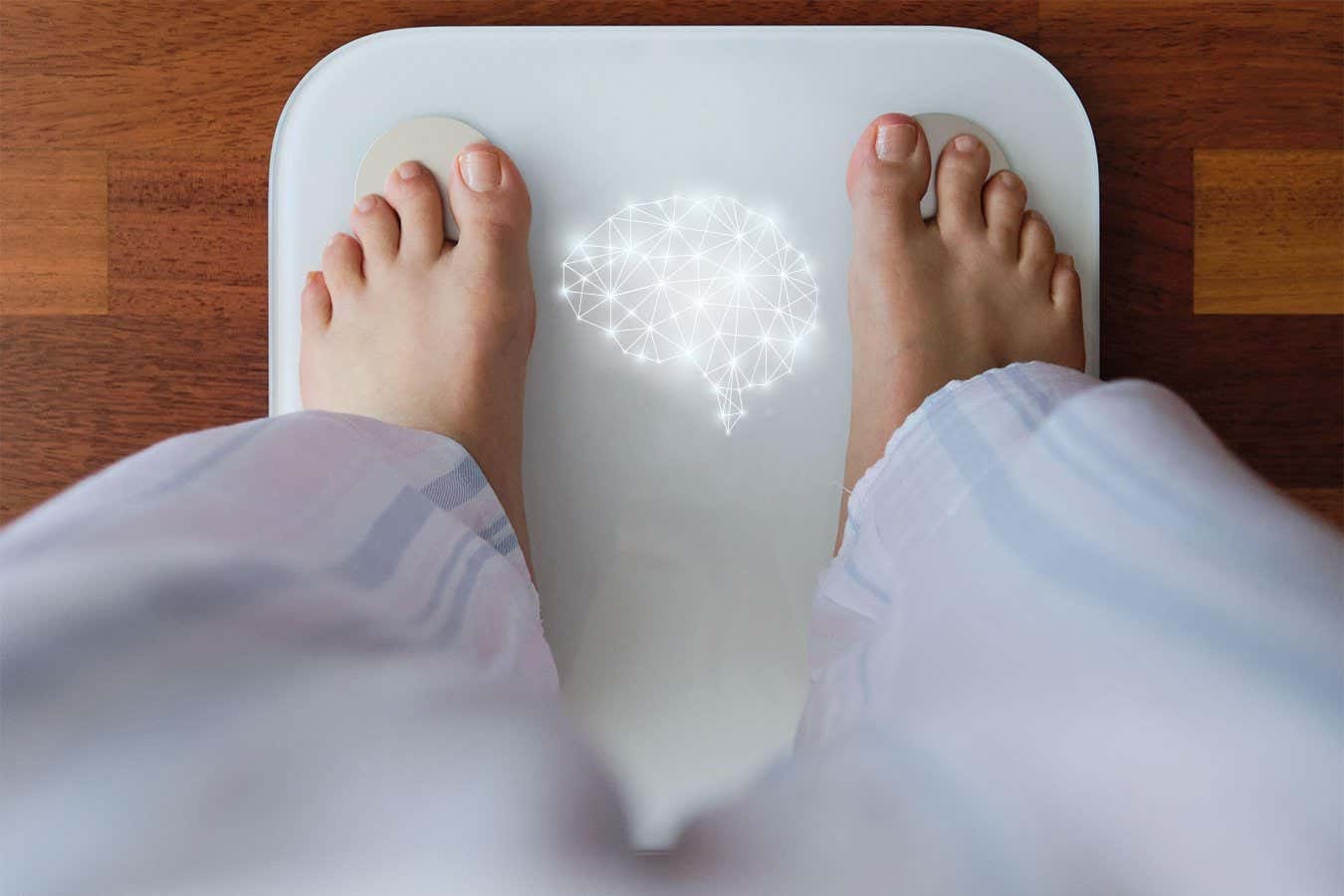The surprising mental health benefits of weight-loss drugs (Behind the Scenes)
Ozempic and Wegovy have unexpected effects on the brain, opening up potential new ways to treat depression, anxiety, addiction, and Alzheimer’s
What if you took Ozempic for depression? Or Alzheimer’s? Or for alcohol use disorder? Or bulimia? It turns out the much-hyped diabetes and obesity drugs have much broader benefits are starting to reshape how we think about mental health and our brains. I wrote a feature for New Scientist about the latest evidence, so read the full story here. (Comment if you want me to send you a PDF, if you can’t get behind the paywall!) But then come back to this behind-the-scenes article, where I’ll share some more eye-opening patient anecdotes that will both excite you — and maybe concern you — about the future of these drugs.
When Maria Morris, a lawyer from Pennsylvania, put on 120 pounds in three years, she thought there was no way out. With a history of PTSD and heroin addiction from years of living on the streets, she fell into a pit of depression after her daughter was born, turning to food to help control her emotions. “The eating then led to being more depressed because I didn’t feel good about myself,” says Morris, whose name has been changed to protect her privacy.
Obesity is a disease you wear, and with this visibility comes judgment. “The feeling I would get was just disgust, like deal with your stuff, handle yourself,” says Morris, which only further deepened her depression. “When I would go to doctors, who you think would be most understanding, they would essentially point to my weight as the reason for everything,” neglecting her other conditions with tiring sermons to eat less and move more.
In a February analysis of over four million patients, patients taking GLP-1s were up to 60-65% less likely to experience anxiety or depression. While this study was purely correlational, experts believe that weight loss itself might explain some of these mental health effects. “When patients are responding, they feel more empowered,” says Dr. Sriram Machineni, an obesity medicine doctor at Albert Einstein College of Medicine in New York. “It's not simply the mood improvement, but a feeling that they have it under control — they feel good about themselves.”
Morris saw this firsthand after she was prescribed liraglutide, an older generation GLP-1 drug, and quickly shed those 120 pounds. “Once I lost the weight, I saw that, if I am late to a doctor’s appointment, they’re more apologetic — ‘Oh, it’s no problem,’” she recounts. “People are not as harsh; people are more helpful.” That, in turn, allowed Morris to “be more social, be more of who I feel is myself” rather than succumbing to a constant fear of rejection.
In my article, I cover how semaglutide (the generic name for Ozempic and Wegovy) has direct effects on mental health, as well as nicotine, cocaine, and other substance us disorders. At the University of Oklahoma, Dr. Jesse Richards observed that his patients on anti-obesity medications — specifically the long-time, heavy drinkers — began quitting alcohol on their own. “I had one patient that spontaneously reported, ‘We’re going out to the lake, and I’m not fun anymore,’” Richards says. For years, he would polish off an eighteen-case of beer over a day of fishing, but with this medication, he’d drink one and just didn’t feel like finishing a second.
“There is a very powerful effect for a lot of people — obviously not everyone — in reducing the intensity of some of these cravings,” Richards says. He notes that GLP-1s can’t do anything to address poor food literacy or the emotional distress underlying some people’s alcohol addiction or disordered eating. But if ongoing randomized controlled trials confirm the preliminary findings, Richards believes GLP-1s could revolutionize mental health care — as part of a holistic treatment regimen, involving dietitians, clinical psychologists, and others.
Morris looks forward to these trials coming out, but she already calls GLP-1s “a miracle drug” because of how they’ve transformed her mental health, even beyond weight loss effects. “I have this second of pause in between the craving and the doing,” Morris says, “and that millisecond or second allowed me to think through the action instead of just focusing on what I wanted physically,” whether it’s eating more food, taking heroin, or giving into her depression. With liraglutide, Morris feels like she can work through her bouts of anxiety or impending doom instead of hiding inside her house and completely shutting down.
Not a Magic Bullet
When Ohio real estate agent Dawn Heidlebaugh was prescribed Ozempic in Fall 2021, she was delighted. It was a once-a-week injection, compared to the daily shot she’d taken for her blood sugar, and the doctor said she might even lose some weight on it.
But with Ozempic, Heidlebaugh quickly got stuck in a dangerous loop. “I took my shot on Sundays,” she says. “By Tuesday afternoon, I’m taking a nap. By Tuesday evening, I feel like crap. Wednesday — I didn’t want to get up; I just didn’t want to get off the couch.” Heidlebaugh is a mother of four with no history of depression, but all of sudden, she could no longer control her emotions. After maybe a year on this drug, Heidlebaugh remembers driving down a farm road, a semi-truck barreling toward her. “And I thought I could just go hit him head on and nobody would really care,” she says. “I never took another shot after that.”
The key clinical trials testing semaglutide and tirzepatide mostly excluded people with depression, anxiety, and other psychiatric disorders to ensure a “clean sample” for studying weight loss, according to Dr. Machineni. And that’s left a blind spot in the research, making it unclear what mental health side effects these high-risk patients might experience on GLP-1s — and under what circumstances.
Those fears boiled over last year following a series of reports of patients on semaglutide and liraglutide experiencing suicidal thoughts. In July, the Europeans Medicines Agency started investigating the safety of GLP-1s, followed shortly by an FDA review. Both their investigations ultimately found no such link, but the risk of rare cases — and other mental health complications — loom large.
Some experts are also concerned that people with anorexia may abuse GLP-1s, or that otherwise healthy people might develop this eating disorder, characterized by extreme caloric restrictions and an intense fear of gaining weight. One of Richards’ patients on tirzepatide, for instance, went 13 days without eating anything, spontaneously going on a water — and diet coke — fast.
Another patient on Ozempic, had terrible nausea and diarrhea but didn’t tell her doctor because she thought they would help her lose weight faster, according to Dr. Karen Trollope-Kumar, chief medical officer of the eating disorder charity Body Brave. “The drug can aggravate obsessive thoughts about weight loss and trigger thought patterns in a dangerous way,” she says.
And if patients stop taking GLP-1s, whether it’s because of side effects, drug shortages, or their prohibitive costs, they risk falling into an even deeper pit of despair than they ever were before. “My body blew up like a balloon,” Heidlebaugh describes after she quit Ozempic. Her doctors put her on a 900-calorie diet, but no matter how much celery she ate, Heidlebaugh kept gaining weight — even more than she had lost on Ozempic. “I felt horrible; I was really miserable.”
Experts argue that, while these risks are alarming, they can be carefully managed. For one, drug shortages will likely resolve as pharmaceutical companies scale up manufacturing capacity, and prices will come down as other anti-obesity drugs hit the market. With increasing awareness about the risk of anorexia, Dr. Richards also says that doctors are doing a better job screening people for eating disorders and counseling them to ensure they don’t stop eating, even if they aren’t hungry.
“This actually has changed my treatment paradigm,” he describes. “Rather than using advanced motivational interviewing techniques to motivate people to reduce their caloric intake, we focus instead on improving the quality and basically the healthiness of the diet.”
The challenge that stubbornly remains is patient selection: with these drugs’ manifold mental health benefits, could people without obesity take GLP-1s safely? “These medications across the board reduce appetite,” says Dr. Machineni, and could thus lead patients without obesity to become malnourished or even critically underweight.
“It will be a good use in someone who has mental health diseases and obesity — two birds, one stone,” Dr. Machineni continues, especially given that the mental health benefits seemingly persist, even as the weight loss effects level off over time.
But using GLP-1s as an everyday mental health treatment will likely require further research — into the exact mechanisms of actions, feasibility of using low doses, and tolerability in patients without overweight or obesity, suggests Dr. Chiadi Ndumele, a director of obesity and cardiometabolic research at Johns Hopkins. Perhaps one day, there will be a new formulation, which doesn’t cause people to lose so many pounds but preserves the independent benefits on mental health, cardiovascular disease, and more. “I know our group is looking into this,” says Ndumele. “Right now, most of that is speculative. I’m hoping that, in the next few years, we'll have a lot more insight.”







Yes! Please share the article with me. - c.henry33@me.com
I'd be grateful if you'd share the article with me please, many thanks.